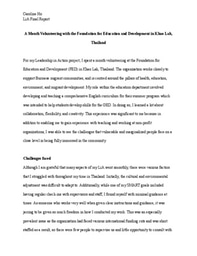What went well?
This week was the final week of the english summer program at FED, which also marked the conclusion of my in-person work at FED. We successfully got our budget proposal for the solar panel installation approved, which was great news! The students also completed their final skills assessment tests, which my co-teacher and I marked; we graded the tests and determined the grading criteria according to the CEFR language proficiency system. This went well as my co-teacher and I have been working together long enough to know how to capitalize on our individual strengths to efficiently collaborate on tasks. Aside from faciliating the students’ assessments, we mostly worked on practicing their writing and speaking skills. We received a lot of positive feedback from the students about these aspects specifically, as they were able to see how their skills translated in day-to-day practice. In particular, multiple students said that they felt much more confident to use their skills with native speakers such as tourists; as such, if they continue to practice their skills, they may be able to obtain better job prospects due to their english skills (e.g. in the tourism or service sectors) despite their limited career options as non-Thai nationals. This would ultimately have a positive impact on their social mobility.
What could have been done differently?
Similarly to previous weeks, it was a bit difficult to get in contact with the staff at FED. This was once again mostly due to the fact that non-profits are typically under-resourced, so it overall was a bit difficult to clarify instructions or stay up-to-date with what was going on at the centre. I often struggled to communicate with coordinators as they were not always accessible. However, we did our best with the given situation and made as many efforts as we could to get in contact with people when we needed guidance or clarification.
What did I learn about myself when working with others?
I learned that although it may take time to get accustomed to a particular system when collaboration is needed, systems typically fall into place over time with patience and effort. By the end of the month, my co-teacher and I were able to facilitate classes really easily and effectively, and I found a lot of enjoyment in teaching this group. Although I was a bit hesitant at the beginning as I did not have much experience teaching and took more of a back seat in the classroom for the first few classes, I found that I really grew into the position over time. By the end of the course, I had learned a lot not only about how to be an effective teacher and mentor to the students, but also how to work well with other effectively.
What did I learn about leadership?
As ane extension of what I learned last week, I learned more about the importance of being culturally and socially sensitive to others’ situations as a leader. Although I was very interested in learning about my students’ and FED staffs’ circumstances and journeys as Burmese migrants, I took a lot of time reflecting and putting myself in their shoes; I ultimately decided that in most cases, it was not appropriate to ask them questions or push them for certain answers. As a leader, being conscientious of others’ situations, given that many of the people I worked with feel a deep attachment to their homeland and have experienced various traumas which they associate with this time, was something that I highly prioritized. In doing so, trust was gradually built with the people I got to know, and I learned much more about them organically on their terms. While a good leader may be interested in others’ stories, building trust is much more important, and as such, they should not pressure others to do things they might not want to do.
What do I want to develop or focus on next?
With my new knowledge gained from my experience at FED, I hope to raise awareness of the conflict in Myanmar. Although I had done some research on the situation prior to arriving in Thailand, I believe that there are admittedly few people outside of Asia who are aware of what is going on and its implications on Burmese people. Further, the things that I learned from my students and other staff at FED who had experienced things firsthand in regards to their beliefs, experiences, and struggles, were much more impactful and insightful than anything I could have read online. Thus, this experienced further supports my belief that learning is most effective in experiential settings, and that education is an inherently political process.


Please sign in
If you are a registered user on Laidlaw Scholars Network, please sign in